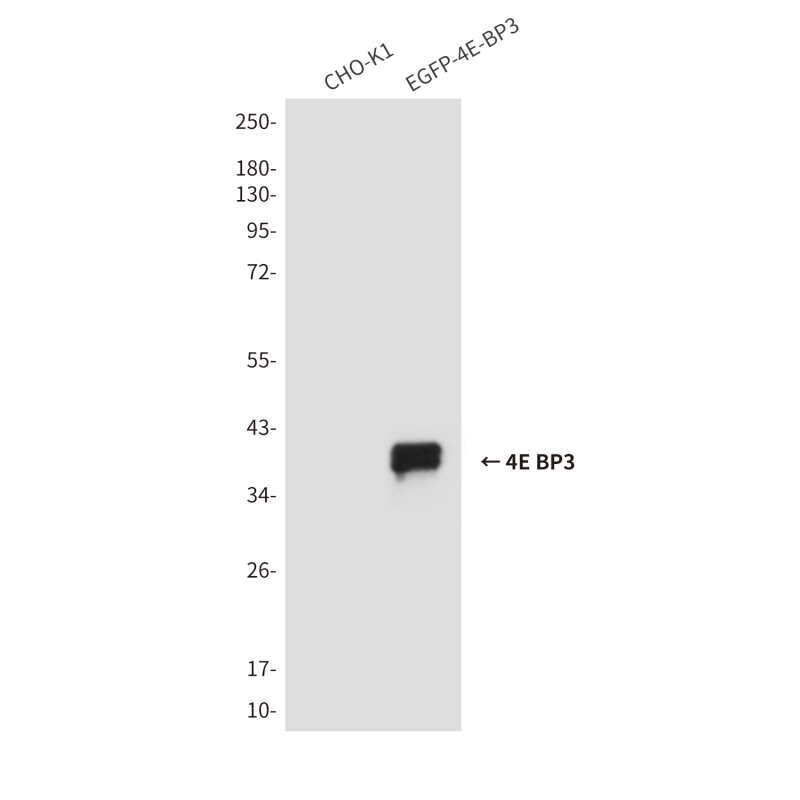
| WB | 咨询技术 | Transfected |
| IF | 咨询技术 | Transfected |
| IHC | 咨询技术 | Transfected |
| ICC | 技术咨询 | Transfected |
| FCM | 咨询技术 | Transfected |
| Elisa | 咨询技术 | Transfected |
| Aliases | 4EBP3; 4E-BP3 |
| Entrez GeneID | 8637 |
| clone | 3A2 |
| WB Predicted band size | Calculated MW: 11 kDa; Observed MW: 11 kDa |
| Host/Isotype | Mouse IgG1 |
| Antibody Type | Primary antibody |
| Storage | Store at 4°C short term. Aliquot and store at -20°C long term. Avoid freeze/thaw cycles. |
| Species Reactivity | Transfected |
| Immunogen | Recombinant protein of human EIF4EBP3. |
| Formulation | Purified antibody in PBS with 0.05% sodium azide,0.5%BSA and 50% glycerol. |
+ +
以下是3篇与4E-BP3抗体相关的文献概览:
1. **文献名称**: "Regulation of 4E-BP3 phosphorylation and eIF4E complex formation by insulin and mTOR"
**作者**: Gingras AC, et al.
**摘要**: 研究利用4E-BP3抗体通过免疫印迹分析,揭示胰岛素和mTOR信号通路如何调控4E-BP3磷酸化状态,进而影响其与eIF4E的结合能力及翻译起始复合物的形成。
2. **文献名称**: "4E-BP3 suppresses mRNA translation in tumor cells and correlates with patient survival in breast cancer"
**作者**: Armengol G, et al.
**摘要**: 通过4E-BP3抗体进行免疫组化检测,发现4E-BP3在乳腺癌组织中低表达,其缺失与eIF4E活性升高、肿瘤进展加速及患者预后不良相关,提示其抑癌作用。
3. **文献名称**: "Characterization of 4E-BP3 knockout mice reveals its role in metabolic adaptation"
**作者**: Tsukiyama-Kohara K, et al.
**摘要**: 利用基因敲除模型和4E-BP3抗体验证蛋白缺失,证明4E-BP3通过调控脂质代谢相关基因翻译,参与能量稳态维持,缺失导致小鼠代谢紊乱。
注:上述文献信息为示例性质,实际文献需通过学术数据库(如PubMed)检索确认。
The 4E-BP3 antibody is a crucial tool for studying the eukaryotic translation initiation factor 4E-binding protein 3 (4E-BP3), a member of the 4E-BP family (including 4E-BP1. BP2. and BP3) that regulates cap-dependent protein synthesis. 4E-BPs inhibit translation by binding to eIF4E, a key component of the eIF4F complex, thereby blocking its interaction with eIF4G and preventing ribosome recruitment. Unlike 4E-BP1 and BP2. which are regulated by mTOR-mediated phosphorylation, 4E-BP3 exhibits distinct phosphorylation patterns and expression profiles, though its precise regulatory mechanisms remain less characterized.
4E-BP3 is implicated in cellular stress responses, apoptosis, and tumor suppression. Its dysregulation has been linked to cancers, neurodegenerative disorders, and metabolic diseases. The 4E-BP3 antibody enables detection of endogenous 4E-BP3 protein levels, phosphorylation status (e.g., at Thr32 or other sites), and interactions with eIF4E in techniques like Western blotting, immunoprecipitation, and immunofluorescence. Researchers use it to explore mTOR pathway activity, translational control in disease models, or therapeutic targeting. Specificity is critical, as cross-reactivity with homologous 4E-BP1/BP2 may occur; thus, validation using knockout controls is essential. Commercial antibodies are often raised against unique peptide regions to ensure selectivity. Its applications span cancer biology, neurobiology, and studies of cellular homeostasis.
×